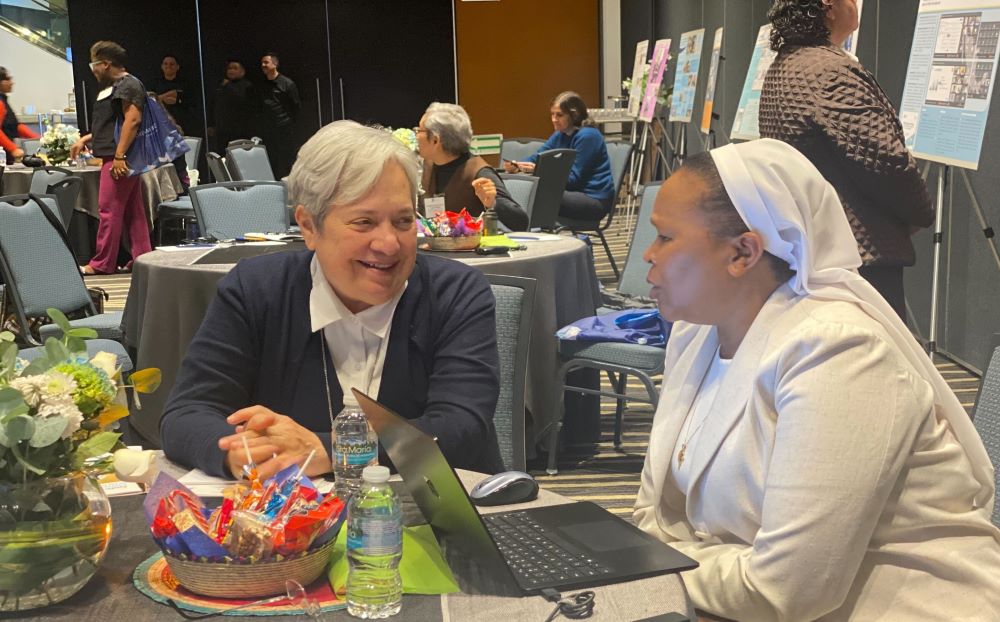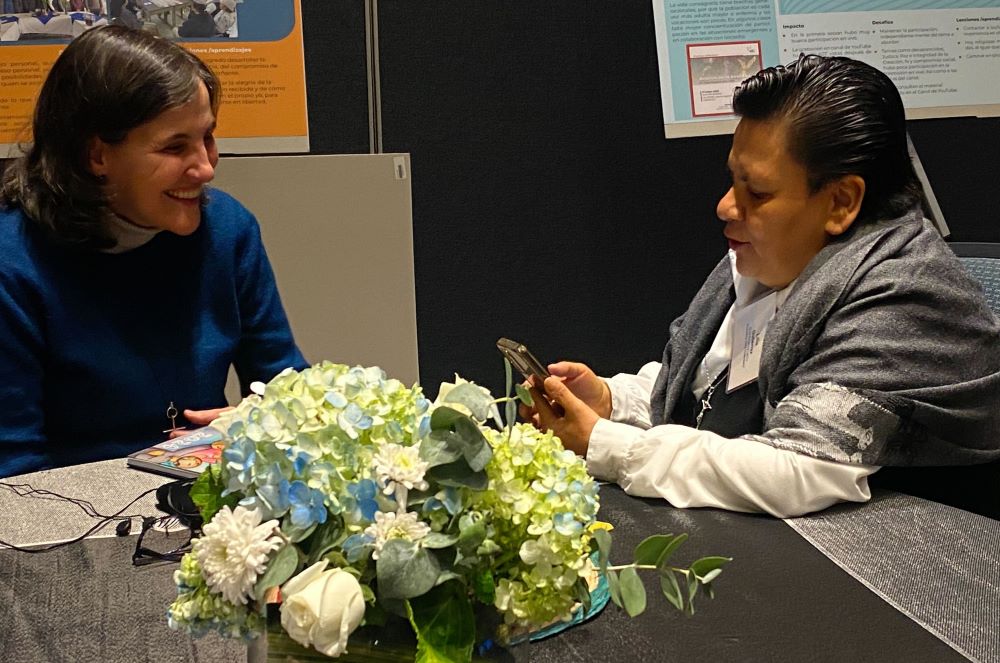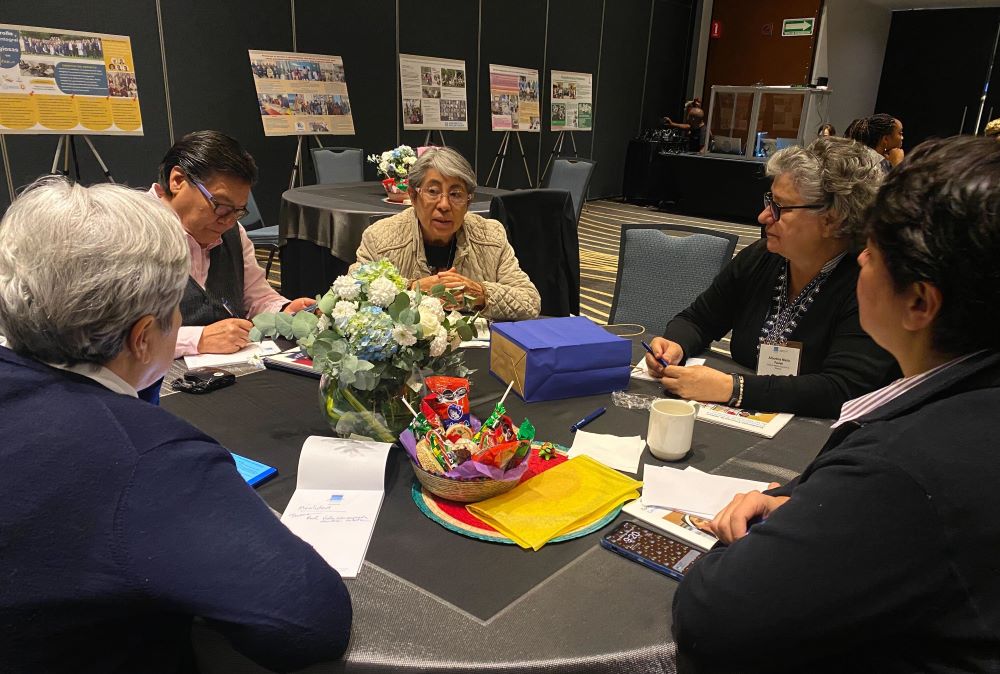
Sr. Norma Pimentel, left, and Sr. Jane Wakahiu, of the Conrad N. Hilton Foundation, chat at the start of the Catholic Sisters Convening Nov. 29 in Mexico City. It was the first time the foundation has held the event in Spanish and in Latin America for sisters who receive funding from the foundation for their ministries in education, health care and other social ministries. (GSR photo/Rhina Guidos)
The 38-year-old woman fought her emotions as she tried to tell the story of how her friendship with Catholic sisters helped her reclaim her life. It was hard for her to say that she had been a commercial sex worker, but the sisters told her she was among friends.
She focused on telling the story of a microloan she had secured, with the help of a project run by sisters in Mexico City, to start a small shop and embark on a different way to support her family.
"I never imagined being a micro-entrepreneur," she said to the room mostly filled with sisters Nov. 29, proudly announcing that she now has a home for her family, adding "human trafficking should be abolished, abolished."
The 40 or so attendees, mostly Catholic sisters, gathered Nov. 28-30 in Mexico City to showcase and talk about their work with vulnerable communities in various parts of Latin America with funding from the U.S.-based Conrad N. Hilton Foundation. (The Conrad N. Hilton Foundation is also a major funder of Global Sisters Report.) The gathering marked the first time the foundation has held a convening in Latin America and in Spanish, said Missionary Sister of the Guardian Angel Sr. Hortencia Del Villar, a senior program officer with the foundation's Catholic Sisters Initiative.
'The work of sisters has to do with their sense of the human person. Every person is made in the image of God.'
—Sr. Hortencia Del Villar
Dubbed the Catholic Sisters Convening, the gathering featured "an encounter of our partners [in Latin America] coming together to share their experience and their mission, to share their projects, to share how they are impacting their communities in areas where Hilton Foundation is supporting, like anti-human trafficking, empowerment of youth, violence against women, and also formation of women religious and programs to support sisters who are in their elderly age," said Del Villar.
Some did so by bringing their success stories in person like the 38-year-old woman who had formerly worked in the commercial sex industry. Also sharing his story was 21-year-old David, who arrived in Mexico from El Salvador at 17, intending to cross the border to the U.S. Instead, he ended up at the CAFEMIN respite center for women and families, run by a community of Josephine sisters in Mexico City.
Feeling like a failure, David experienced suicidal thoughts and attempted to take his life. Sometimes the sisters found him in a corner of the center crying but got him help and then "gave him a little push" to take culinary classes, said Josephine Sr. Maria Magdalena Silva Renteria, one of the founders of CAFEMIN.
Now he loves baking pastries, which he shares with other migrants at the center, she said, like a proud mother.
"They are valuable people," said Silva, but sometimes they face rejection, feelings of failure, and then they encounter crime and abuse on an already difficult journey. "Like David's, there are a lot of stories, a lot of stories."

Sr. Liliana Franco, left, and and Sr. Lilia Guillermina Gutiérrez Aguirre greet one another at the start of the Conrad H. Hilton Foundation’s first Catholic Sisters Convening Nov. 29 in Mexico City. It was the first time the Conrad N. Hilton Foundation has held the event in Spanish and in Latin America for sisters who receive funding from the foundation for their ministries in education, health care and other social ministries. (GSR photo/Rhina Guidos)
"The work of sisters has to do with their sense of the human person. Every person is made in the image of God. And because every person is made in the image of God, every person has a message of God's love to us," Del Villar told GSR Nov. 28. "And every person deserves a dignified place to live and a dignified opportunity to continue on their journey. And so, it's, as Pope Francis says, a culture of encounter where both those who are supporting and those who are coming in are learning from one another, valuing one another, and being supported by one another."
Other sisters, including Sr. Zulema Gonzalez, of Chile's Corporación Tejiendo Solidaridad (Weaving Solidarity Corporation), shared how they care for elderly sisters who face debilitating illnesses such as Alzheimer's disease, dementia and other ailments "after giving everything of themselves" and then finding themselves alone because their communities ceased to exist.
"Some of them cared for women, for children," she told GSR Nov. 29, but found themselves with nowhere to go, no one to help when they needed it. "So, a group of us [from different congregations] said 'we're going to unite to help those who gave everything for the kingdom.' "
Sr. Jane Wakahiu, a member of the Institute of the Little Sisters of St. Francis in Kenya and the foundation's head of Catholic Sisters Initiative as well as associate vice president for program operations, told the sisters gathered to get to know one another, their work and other congregations to see how they could work together to create change, impact the community and accompany the vulnerable, without duplicating efforts.
"You are the experts," she told them.

A group of Catholic sisters talk about their ministries Nov. 29 at the start of the Catholic Sisters Convening in Mexico City. The gathering marked the first time the Conrad N. Hilton Foundation has held the event in Spanish and in Latin America for sisters who receive funding for their ministries in education, healthcare and other social ministries. (GSR photo/Rhina Guidos)
Del Villar said the foundation also wanted sisters to understand the organization's strategy. "What is our vision, what is our goal? Why are we joining together and co-designing our projects together?" But the foundation also seeks to highlight their work.
"We want to advance leadership of women religious, elevating their voice, elevating the excellent work they're doing in their ministries, and in Mexico, especially, their ministries around supporting families who are migrants," she said.
The gathering hosted a panel Nov. 28 in which sisters talked about their responses to immigration, and a discussion about the link between migration and human trafficking, the impact of the pandemic on creating more victims, as well as dealing with threats sisters have received because of their work in that area. But they also talked about the toll these issues take on many women religious.
"There are a lot of sisters who burn out," CAFEMIN's Silva said.
Xaverian Sr. Maria Teresa Santillan Rodriguez, of Red Rahamin, a network in Mexico of women religious against human trafficking, said the work is hard but there's one thing that sustains her.
"Following Jesus," she said. "He would never just cross his arms."
United in that passion, sisters have been powerhouses for good, but as their numbers dwindle and fewer vocations materialize, "the value of networks is important," Del Villar said.
Advertisement
"There's more of a sense of openness to connection, to working together, acknowledging that we can no longer work in silos, maybe as we used to do when we had 300, 400 sisters [in one community]," she said. "We had our own hospitals, we had our own educational institutions. It was all one congregation. Now there's different congregations working in one ministry to empower that ministry."
More and more, they're also working with lay members. Some were included in the Mexico City convening.
"We have about five lay women who are the directors or project managers of the projects that the sisters are leading, and they work hand in hand with the sisters, and they're doing great work," Del Villar said. "I heard from the sisters and also from their partners, that it's an enriching collaboration where their gifts, all of the gifts are being appreciated, and all of the gifts are important in building capacity for the project."
It was exciting to host the sisters "in their language, in their culture," said Del Villar, and a realization of a dream to learn from them in their environment. "They are very inspired just to be here, just to listen to them. And even though some of them do not understand Spanish, they understand the language of love and encounter and the hospitality," she said.





